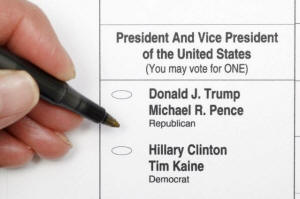|
U.S. vote authorities warned to be alert
to Russian hacks faking fraud: officials
 Send a link to a friend
Send a link to a friend
 [October 21, 2016]
By David Rohde and Mark Hosenball [October 21, 2016]
By David Rohde and Mark Hosenball
(Reuters) - U.S. intelligence and law
enforcement officials are warning that hackers with ties to Russia's
intelligence services could try to undermine the credibility of the
presidential election by posting documents online purporting to show
evidence of voter fraud.
The officials, who spoke on condition of anonymity, said however, that
the U.S. election system is so large, diffuse and antiquated that
hackers would not be able to change the outcome of the Nov. 8 election.
But hackers could post documents, some of which might be falsified, that
are designed to create public perceptions of widespread voter fraud, the
officials said.
They said that they did not have specific evidence of such a plan, but
state and local election authorities had been warned to be vigilant for
hacking attempts.
On Oct. 7, the U.S. government formally accused Russia for the first
time of a campaign of cyber attacks against Democratic Party
organizations to interfere with the election process.

U.S. officials familiar with hacking directed against American voting
systems said evidence indicates that suspected Russian government-backed
hackers have so far tried to attack voter registration databases
operated by more than 20 states. Tracing the attacks can be difficult
but breaches of only two such databases have been confirmed, they said.
The officials said there is no evidence that any hackers have succeeded
in accessing equipment or databases used to record votes. Many states
use systems that would be difficult to hack or defraud, including paper
ballots which initially are tallied by machines.
U.S. elections are run by state and local officials, not the federal
government. On Nov. 8, votes will be cast in hundreds of thousands of
polling stations in 9,000 different jurisdictions, according to the
National Association of Secretaries of State.
[to top of second column] |

A sample ballot is seen in a photo illustration, as early voting for
the 2016 general elections began in North Carolina, in Chapel Hill,
North Carolina, U.S. October 20, 2016. REUTERS/Jonathan Drake

The U.S. officials declined to comment on Republican candidate
Donald Trumpís contention that the election is being "rigged." Trump
said in the third and final presidential debate with Democratic
candidate Hillary Clinton on Wednesday night that he would not say
until the election results were known whether or not he would accept
the outcome.
Trump and his campaign officials have repeatedly said that the
potential for voter fraud remains high but they have not provided
any evidence.
On Thursday, Trump said he would accept the results of the election
"if I win." He said he reserved the "right to contest or file a
legal challenge in the case of a questionable result."
Clinton supporters said Trump is unwittingly aiding an effort by
Russian President Vladimir Putin to undercut the credibility of the
vote. Washington and Moscow are at odds over several issues, from
Russian involvement in the Ukraine conflict, the war in Syria and
cyber attacks.
"Trump does not even know he is being manipulated," said Michael
Morell, a former deputy CIA director who has endorsed Clinton.
"Trump is an unwitting agent of Putin."
(Reporting By David Rohde in New York and Mark Hosenball; in
Washington; editing by Grant McCool)
[© 2016 Thomson Reuters. All rights
reserved.]
Copyright 2016 Reuters. All rights reserved. This material may not be published,
broadcast, rewritten or redistributed.
 |